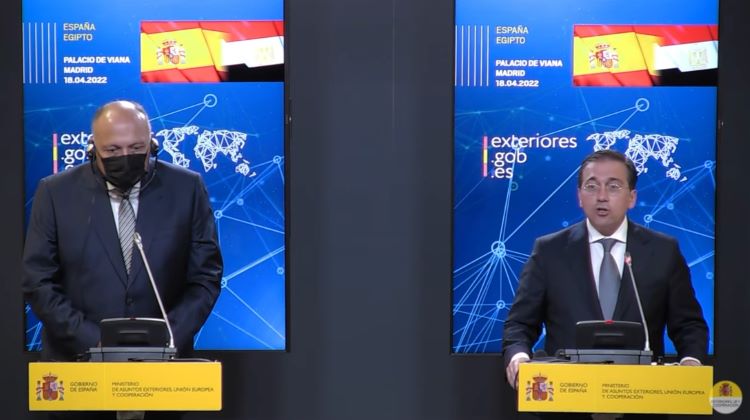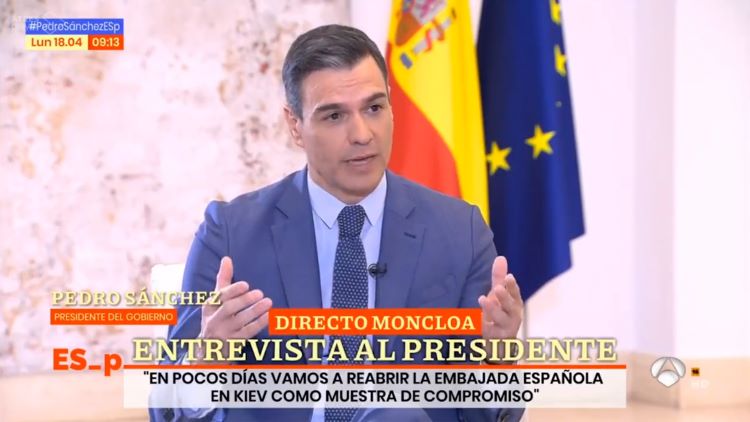Eduardo González
The Minister of Foreign Affairs, José Manuel Albares, played down yesterday the importance of the agreements signed by Italy with Algeria and Egypt for the purchase of natural gas because, he said, Spain continues to be an “irreplaceable country” in the process of regasification of liquefied natural gas (LNG) and, therefore, “will always be a point of reference within the European gas market”.
The hydrocarbons company ENI – 30% state-controlled – yesterday announced an agreement with the Egyptian natural gas company EGAS to increase LNG flows to Italy in order to reduce its energy dependence on Russia. Egypt aims to become an important source of natural gas for Europe in the current context of crisis with Moscow. In addition, Algeria last week made a commitment to Mario Draghi’s government to increase gas exports to Italy. Algeria has been until now the main gas supplier to our country, but diplomatic relations between Algiers and Madrid have seriously deteriorated following the decision of Pedro Sanchez’s government to accept the Moroccan autonomy plan for Western Sahara.
“The gas business structure in Spain and Italy are different,” Albares said yesterday during a joint press conference with his Egyptian counterpart, Sameh Shukry, at the Viana Palace in Madrid. “In Spain they are contracts of private companies and in the Italian case there is a public company as well; therefore, the relations are different,” he continued. “There are Spanish companies that have important interests in Algeria with international contracts,” he added.
In any case, “Spain continues to be a central point for everything related to LNG regasification and is an irreplaceable country for this in Europe and, therefore, Spain will always be a point of reference within the European market, not only in the Iberian market, for everything related to the international gas market”, added the minister, who specified, without further details, that during his interview with Shukry “both energy and gas issues” had been addressed.
Spain-Egypt relations
According to Albares, Spain and has a “deep interest of Spain in strengthening political, economic and cultural ties with Egypt”, which resulted yesterday in the signing of “a Memorandum of Understanding between our Diplomatic Schools that will allow closer diplomatic, human and professional contacts”. Apart from that, the two countries are “working to increase trade and business investments” in order to “alleviate” the impact “that the war in Ukraine is already having on our economies”.
On the other hand, the minister affirmed that “Egypt is a key partner for Spain in the Euro-Mediterranean region” because “its views on Middle East peace and the Libyan and Syrian crises are fundamental.” “Spain, because of its geographical location, history and cultural proximity, is a fundamental country in the Mediterranean, as is Egypt, and, within the EU, it has a “special sensitivity towards the other shore of the Mediterranean and towards the Arab world,” the minister continued. “We countries on the southern shore of the EU have a role, which is to sensitize the Nordic and eastern countries to the importance of the southern shore, the Mediterranean and the Arab world,” he added.
For his part, Sameh Shukry assured that “Spain is a very close friend, a country that understands us and understands the dynamics of the Mediterranean region and the development of Egypt in the last 50 years.” “We have similar visions on issues such as the peace processes in Libya, Syria and Yemen and the fight against terrorism and also in multilateral forums” and Egypt “has the support of Spain in its dialogue with the EU,” he continued.
Therefore, he assured that Egypt is very interested in “boosting relations with Spain, which have been strengthened by the visit of President Abdelfatá al Sisi to Madrid in 2015 and with the recent visit of President Pedro Sánchez to Cairo in December”, and wants to “strengthen relations in the political, economic and cultural fields”. In this regard, the minister implied, without further details, that Al Sisi could consider a new official visit to Spain. “The president is always receptive to opportunities for future visits to Spain,” he assured. “Bilateral relations are “of enormous importance” and, therefore, Al Sisi wants to “take every opportunity within reach to meet” with Sanchez, either bilaterally or through “their joint participation in international forums.”
Prior to the meeting with Albares, Sameh Shukry was received at the Zarzuela Palace by King Philip VI, in the presence of the State Secretary for Foreign and Global Affairs, Ángeles Moreno Bau; the Spanish Ambassador to Egypt, Ramón Gil-Casares; and the Egyptian Ambassador to Spain, Youssef Diaeldin Mekkawy. The Egyptian minister will participate today in a forum with Spanish companies.







